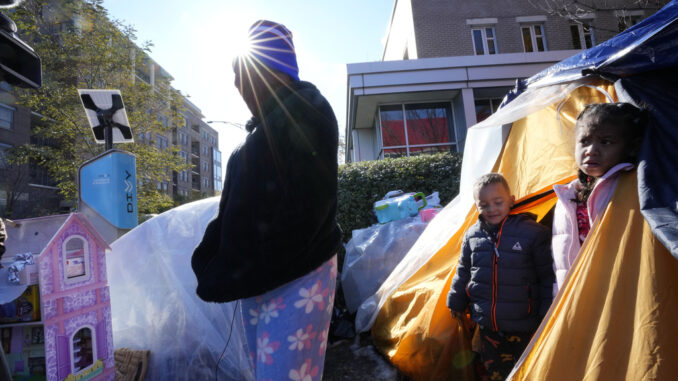
CHICAGO — Gov. J.B. Pritzker announced last week that Illinois will funnel an additional $160 million to help migrants arriving in Chicago to resettle, including $65 million to help the city launch “winterized” temporary shelter to avoid people sleeping outdoors in cold weather.
The announcement came on an unseasonably warm Chicago day in the 60s, but with a forecast for temperatures to dip as low as 17 degrees Fahrenheit within a week. Most of the roughly 24,000 asylum seekers who have come to Chicago since Gov. Greg Abbot began sending buses last year.
Chicago and other U.S. cities, including New York, have struggled to house asylum-seekers as winter weather hits and accommodate a growing migrant population. State officials said roughly 700 new migrants arrive each week.
Similar issues could occur as wintry weather closes in on New York, which is struggling to accommodate a growing migrant population, and Denver, which was prompted to loosen its rules on how long migrants are kept in shelters during a recent cold snap.
New York City Mayor Eric Adams announced wide-ranging budget cuts that he warned would only be the beginning without state and federal support for the tens of thousands of migrants that have arrived since last spring.
In Massachusetts, advocates for migrant families are relying on airport lounges, hospital waiting rooms and churches after the state capped the number of beds in family shelters and offered few options for those facing homelessness.
Illinois has already spent or committed more than $638 million to address the humanitarian asylum seeker crisis, officials said. The additional funds will come from the Illinois Department of Human Services. Chicago is in charge of housing new arrivals and has also spent hundreds of millions of dollars trying to accommodate them.
Pritzker said the state has stepped in now because the city has moved too slowly. Chicago has come under scrutiny from immigrant rights groups, local leaders and residents for its handling of the crisis which has heavily relied on volunteers.
“The city’s been operating its own methodology process. And it hasn’t moved fast enough,” Pritzker said at a news conference at a state building in Chicago. “We’re stepping in here to try to help and accelerate this process.”
Mayor Brandon Johnson, who took office in May, has called it an inherited problem and one the city is working to address. Earlier this week, he announced new limits on how long migrants can stay at city-run shelters and said more resources would come from the state and county.
Roughly 2,500 men, women and children are awaiting placement at city-run shelters and sleeping inside or outside police stations or at O’Hare International Airport, according to the city.
Of the $160 million new investment from the state, $30 million will be dedicated to setting up an intake and welcome center to better assist those coming to Chicago who already have a place to stay with friends or relatives, or who plan to continue on to another location, according to the governor.
Another $65 million will go toward helping Chicago set up a “winterized soft shelter site” providing temporary housing for up to 2,000 people.
Pritzker called on Congress to address the issue.
“We’re being forced to try to solve a federal-sized problem at the state and local level,” he said.
Johnson and the mayors of four other cities, including New York, wrote to President Joe Biden earlier this month seeking more federal resources. He and Denver’s mayor met with the White House chief of staff and Homeland Security Department officials the next day.
New York City has spent $1.45 billion on the humanitarian crisis this fiscal year and is on track to spend nearly $11 billion over the next two years, Adams said, announcing cuts that would close libraries on Sunday, reduce spending on pre-K and freeze police hiring.
“No city should be left to handle a national humanitarian crisis largely on its own,” Adams, a Democrat, said, “and without the significant and timely support we need from Washington, D.C., today’s budget will be only the beginning.”
The announcement drew criticism from several fronts, including Immigration Coalition Executive Director Murad Awawdeh, who accused Adams of scapegoating asylum seekers, rather than improve the city’s shelter system.
Adams has said more than 122,700 asylum seekers have come through New York City’s intake system since last spring.
Biden has requested $1.4 billion from Congress to help state and local governments provide shelter and services for migrants, after earlier pleas from Democratic mayors and governors.

